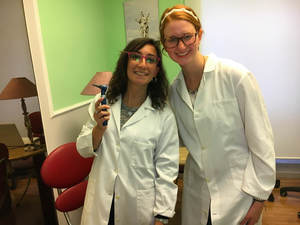 "
"
Few issues are more frustrating than catching a bug on a trip to Italy. For many travellers, the struggle of finding a doctor in a foreign country who speaks their language is a daunting task. The comforts of home are far away, and there are many historical sites to visit. However, English-speaking visitors to Rome are in luck because of Doctors in Italy, the Italian association of English-speaking doctors, with headquarters in the heart of Rome. During my semester studying abroad at John Cabot University, I shadowed and interned for Doctors in Italy, where I discovered a new passion for Rome, studied health care systems and became a global researcher.
Studying abroad provided me the opportunity to travel and learn about different cultures. However, John Cabot did not offer any science courses that fit my curriculum on my journey towards medical school. For many science majors, studying abroad in Rome at JCU can seem impractical because of the lack of science courses. I struggled with this fact, but I was determined to find a way to fit my love of science and the Italian culture together.
I found myself on a plane, then on a bus and finally in Rome in front of a flyer advertising a meeting about internships with the career center at JCU. I walked into the meeting and quickly felt out of place among the many degree-seeking students who were looking for year-round positions. Terrified, and just wanting to go to lunch, I asked the director if she had any opportunities that allowed me to shadow doctors.
Little did I know that I had just asked a question that would change my academic career for the rest of my life.
I was given an interview, which was part of an extremely competitive selection process, and just one day later I received the heartwarming email welcoming me as the first intern/pre-medical student to both shadow and work at Doctors in Italy. When I arrived, I knew that I had secured the most incredible internship that I could have ever imagined. During my time there, I shadowed doctors in orthopedics, gynecology, surgery, dermatology and many others. The most interesting thing about Doctors in Italy is that all of these different specialty doctors come to the patient in one clinic. Additionally, the clinic has a general practitioner who is always ready for appointments. All of the physicians speak fluent English — along with many other languages — and can clearly connect with patients to make them feel comfortable in a new country.
The services and opportunities in this clinic astounded me. The staff communicates with patients over the phone and via Facebook Messenger, Whatsapp, e-mail and more. It made me wonder what the United States health system would be like if I could simply text or direct message my doctor to make an appointment.
The United States and Italy have vastly different ways of approaching health care. The U.S. has the benefit of insurance providers and high-tech hospitals in nearly every city. This provides a system for an expected level of care in the U.S. In Italy, however, all health care is “free.” When I first heard this, I was, of course, in disbelief due to the exorbitant medical bills that accompany a hospital or doctor visit in the United States. In Italy, however, I was told that if a patient is diagnosed with cancer then all of the medical bills are covered by the health care system.
Again, I was in shock. The label “free” is essentially true, but Italian citizens pay a comparatively large amount of taxes for health care. Another drawback to the Italian healthcare system is the lack of funding for many public hospitals. Yet Italy is currently ranked as the second-best nation in health care by the World Health Organization, with the United States at a distant No. 37. In my opinion, both countries should strive for a healthy balance between “free” and “exorbitant” that keeps taxes relatively low and public hospitals funded while keeping citizens capable of paying for healthcare without breaking the bank.
At my internship, I not only shadowed doctors but also learned about the Italian health care systems and maintaining a global health community. My internship also led to new research projects and many exciting opportunities. My next step will be writing and working on a research project with the doctors I met. I was also excited to realize that my shadowing experience had positively impacted the organization since it contributed to the creation of a formalized shadowing program open to all pre-health students.
Studying abroad can be stressful, but it can offer so many once-in-a-lifetime experiences — especially for pre-medical students. I wholeheartedly recommend that each student venture out to research, learn and find a niche in a study abroad program. Through persistence, passion and a willingness to learn, there is a life-changing opportunity for every student while studying abroad.
Editor's Note: The views of this author are not necessarily the views of Scholastic Magazine.